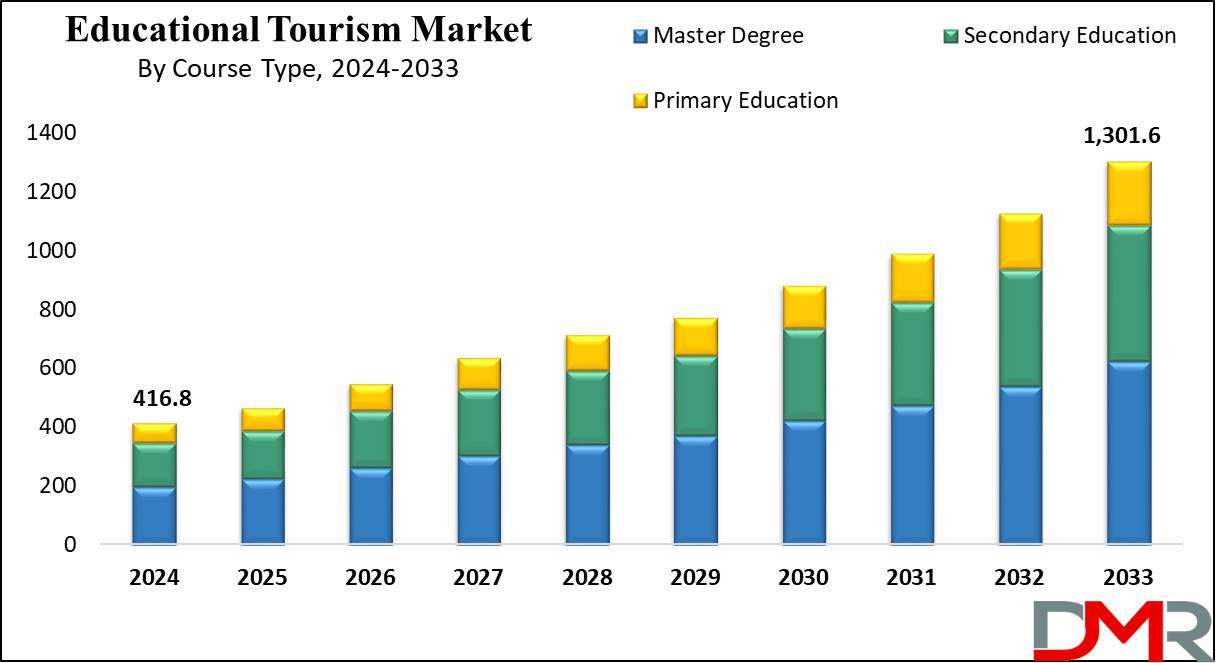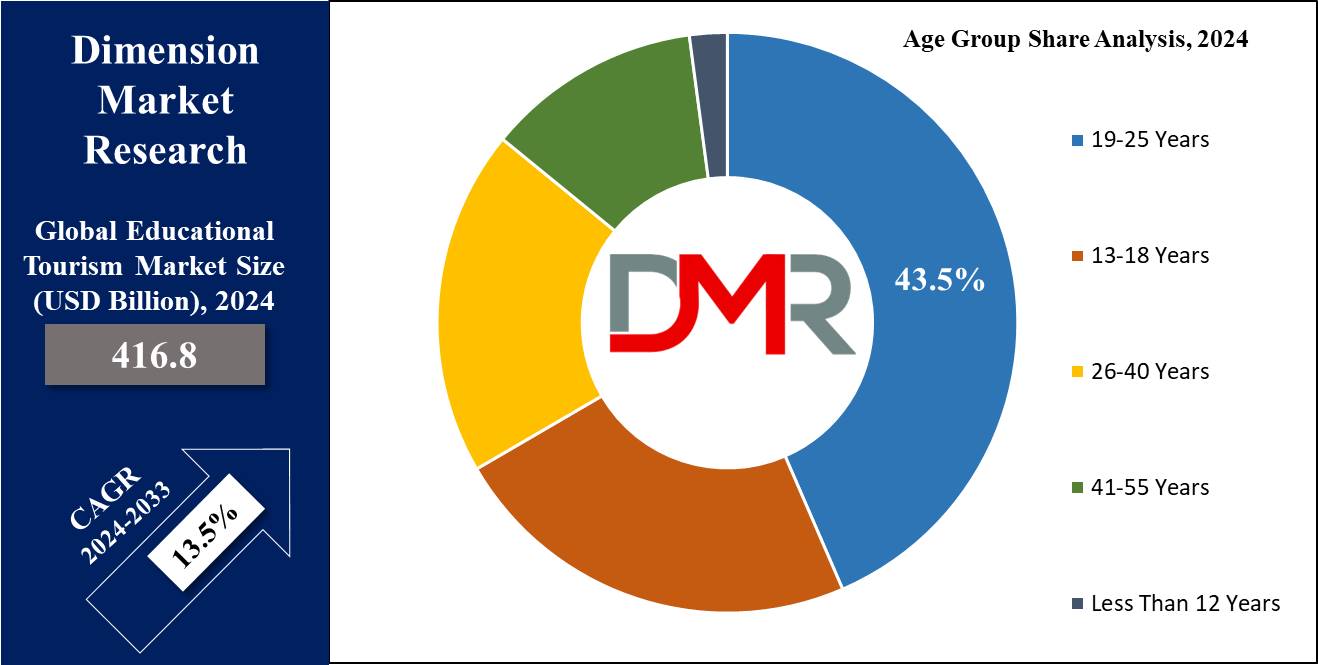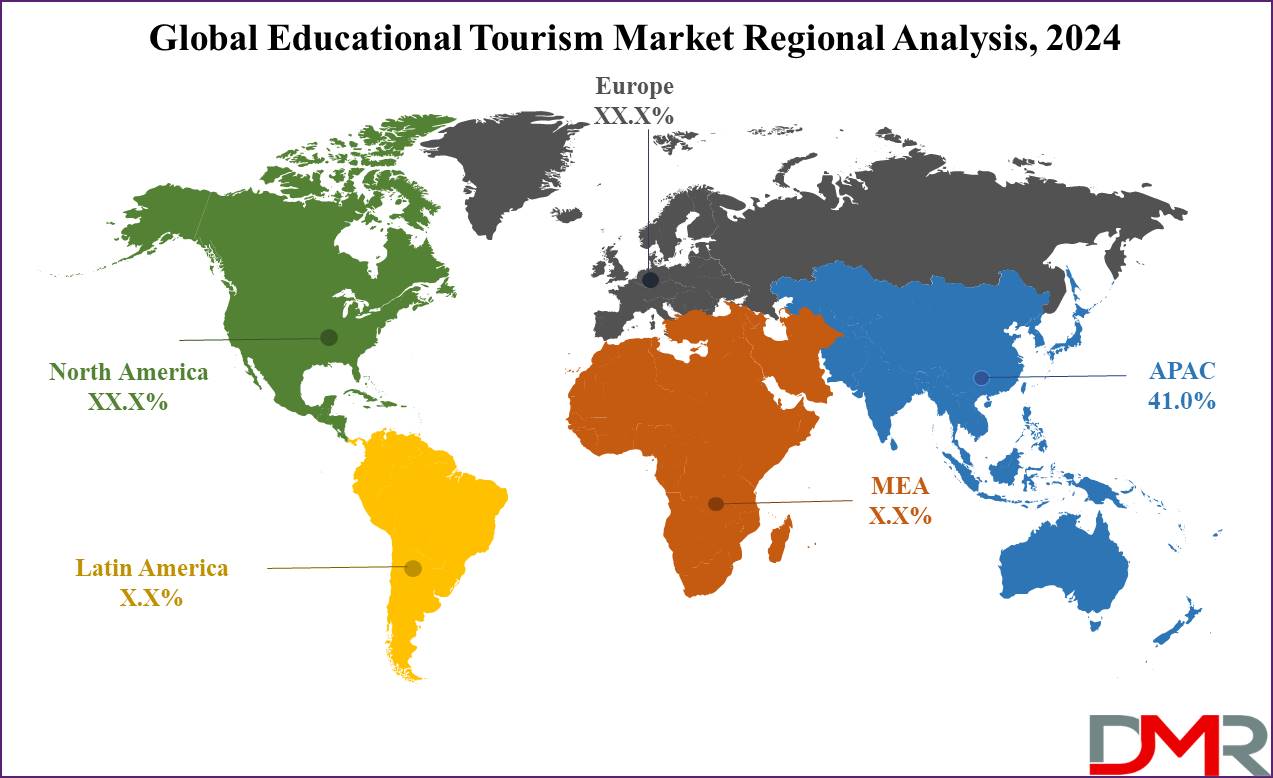Market Overview
The Global Educational Tourism Market size is expected to reach a market value of USD 416.8 billion in 2024 which will further increase and will reach USD 1,301.6 billion in 2033 at a CAGR of 13.5%.
The global educational tourism marketplace represents a dynamic sector that combines travel and learning to provide people with possibilities for cultural immersion, private growth, and educational enrichment. With a growing emphasis on experiential studying and cultural trade, academic tourism encompasses a huge variety of packages and activities tailor-made to diverse hobbies and age groups, including language immersion courses, study overseas programs, eco-tours, and volunteer opportunities. Key drivers of growth in this market consist of growing disposable incomes, improvements in transportation infrastructure, and a growing interest in lifelong learning.

Additionally, educational tourism contributes to sustainable improvement by promoting cross-cultural understanding, helping local economies, and fostering environmental conservation efforts, aligning with the principles of the
Green Technology & Sustainability Market. As technology continues to reshape the travel landscape, educational tourism corporations are innovating with virtual reviews and digital learning platforms to enhance accessibility and adapt to changing client preferences, ensuring that educational tour remains a compelling alternative for global explorers looking for significant meaningful experiences and intellectual stimulation.
Key Takeaways
- Market Value: The market size is projected to reach a market value of USD 467.2 billion in 2025, in comparison to USD 1,301.6 billion in 2033 at a CAGR of 13.5%.
- Market Definition: The educational tourism marketplace encompasses travel experience aimed at facilitating learning, cultural exchange, and personal growth through activities that include overseas study packages, language courses, and guided tours.
- Age Group Segment Analysis: The educational tourism market based on age group 19 to 25-year age group is expected to exert its dominance in the age group segment with a market share of 43.5% by the end of 2024.
- Type of Occupation Segment Analysis: Students are projected to exert their prominence in the type of occupation segment with the highest market share in 2024.
- Course Type Segment Analysis: A master's degree is projected to command the educational tourism market with a 47.9% market value in 2024.
- Growth Driver: The driving force of the academic tourism marketplace consists of the growing emphasis on experiential learning, rising disposable earnings, improvements in transportation, and a developing interest in cross-cultural exchange and personal improvement.
- Regional Analysis: Asia Pacific is predicted to dominate the educational tourism market with 41.0% of the market share in 2024.
Use Cases
- Language Immersion Programs: Students immerse themselves in an overseas way of life, enhancing language capabilities through interactive classes, cultural activities, and real-world conversation experiences.
- Cultural Exchange Tours: Participants engage in hands-on learning stories, exploring historic sites, museums, and local traditions to deepen their understanding of different cultures.
- Study Abroad Programs: Students enroll in educational courses at international universities, gaining global views, cross-cultural competence, and personal growth by studying abroad.
- Environmental Education Trips: Travelers take part in eco-tours and conservation projects, getting to know about environmental issues firsthand at the same time as contributing to sustainability efforts in herbal habitats and communities.
- Professional Development Retreats: Educators, professionals, and government officials attend conferences, workshops, and seminars globally to exchange information, build networks, and improve talents relevant to their fields, a key aspect of the EdTech market.
Market Dynamic
The global educational tourism market exhibits dynamic trends driven by a variety of factors. The rise in globalization and interconnectedness have fueled a developing interest in cross-cultural experiences and educational opportunities, experiential learning, propelling the need for educational tourism. Rising disposable incomes, especially in emerging economies, have empowered a greater number of people to pursue travel opportunities targeted at non-public growth and intellectual enrichment. Additionally, advancements in transportation infrastructure, which include less costly air travel and improved accessibility to far-off destinations, have multiplied the reach of educational tourism programs.
Moreover, the evolving landscape of education, with a greater emphasis on lifelong knowledge of and realistic talent improvement, has spurred interest in diverse academic travel experiences. Furthermore, societal developments closer to sustainability and environmental awareness have brought about the emergence of eco-tourism and accountable tour alternatives inside the educational tourism market, often overlapping with the
ecotourism market. Overall, the marketplace dynamic is characterized by way of a fusion of cultural curiosity, economic empowerment, technological advancement, and a developing emphasis on sustainability, shaping the future trajectory of education tourism globally.
In the evolving landscape of global tourism, educational tourism emerges as a dynamic segment fueled by a growing demand for authentic travel experiences and a thirst for knowledge. Sustainable tourism practices are increasingly becoming a priority, with travelers, especially in Latin America, seeking eco-friendly options that minimize environmental impact. Market insights reveal a significant emphasis on age group segmentation, catering to diverse educational needs and interests across generations.
Leading market players like EF Education First Kids and ACIS Educational Tours capitalize on this trend, offering comprehensive educational experiences tailored to specific age groups and education types. As demand for better education drives growth, EF's strong market position underscores its supremacy in the global educational tourism market. Looking ahead, market forecasts project exponential growth, with the tourism market size expected to surpass expectations, particularly in regions like Latin America.
With a focus on sustainability, educational institutions, and providers are poised to lead the way, offering educational and cultural immersion programs that inspire and educate travelers of all ages. Comprehensive market research reports provide valuable insights into market trends, key players, and factors driving market growth, shaping the future of the educational tourism business worldwide.
Research Scope and Analysis
By Age Group
The age group of 19-25 years is expected to dominate this market in the context of age group with 43.5% of market share in 2024. The age group of 19-25 years dominates the academic tourism market because of several key factors people within this age bracket of 19 to 25 are normally within the midst of their higher education journey, both pursuing undergraduate or graduate studies. This stage of life is characterized by educational enrichment, personal growth, and exposure to diverse cultures and views, making educational tourism an attractive choice.

Moreover, people in the 19-25 age institution are often more independent and adventurous, searching for possibilities to step out of their consolation zones and discover the world. Unlike younger age groups who might also require parental supervision or logistical assistance, young adults aged 19-25 are more able to plan and execute their educational travel experiences autonomously.
Furthermore, many academic institutions encourage or push college students to participate in study abroad programs or global internships at some stage in their college years, driving demand within this age demographic. Additionally, people in their early twenties are frequently more flexible in terms of time and commitments, permitting them to adopt longer-period journeys or semester-long overseas study programs. This tourism market based on age is also much more likely to have access to resources including scholar loans, scholarships, or element-time jobs to finance their academic travel endeavors.
By Type of Occupation
Students tend to dominate the educational tourism market in the context of the type of occupation segment because for several compelling reasons the highest market share in 2024 like students, especially the ones in higher education, are at a stage in their lives where they actively are seeking opportunities for personal and educational growth. Educational tourism offers them a chance to enhance their learning experience beyond conventional study room settings, presenting hands-on exposure to diverse cultures, languages, and worldwide perspectives. Additionally, many instructional establishments encourage or require students to take part in have a look at overseas applications, internships, or exchange programs as a part of their curriculum, thereby driving vast demand within this demographic.
Moreover, students regularly have more flexible schedules in comparison to professionals with full-time jobs, permitting them to embark on longer-duration trips or semester-long study abroad programs. They also are more likely to have access to financial aid, scholarships, or part-time employment possibilities to fund their instructional travel endeavors. Furthermore, young college students, especially those in university or college, are commonly more open-minded, adventurous, and inclined to include new experiences, making them ideal candidates for educational tourism activities.
Additionally, the prevalence of student-focused travel discounts, group prices, and specialized packages are tailored to their interest in addition to incentivizing students to interact in educational tourism. Overall, the mixture of educational motivations, flexibility, financial help, and adventurous spirit positions college students as the dominant force in the educational tourism market.
By Course Type
Master's degree programs are projected to dominate the global educational tourism market in the course type segment with 47.9% of market share in 2024. Master's degree programs regularly dominate the instructional tourism section as many students are pursuing a master's degree is a massive educational and professional milestone for plenty of people, frequently representing an essential step toward career advancement and specialization. Educational tourism gives master’s college students opportunities to complement their educational studies with international experience, such as attending meetings, workshops, or specialized publications provided by famous educational establishments abroad. These experience not only enrich their educational understanding but also provide valuable networking possibilities and exposure to global perspectives, improving their professional development and competitiveness in the job market.
Moreover, master's degree students normally have a higher level of instructional maturity and independence in comparison to those in secondary or primary education. They are more likely to actively look for instructional tourism possibilities that align with their academic interests, research goals, and professional aspirations. Additionally, many master's degree programs are designed to accommodate part-time or flexible study alternatives, permitting students to balance their educational commitments with travel experiences.
Furthermore, master's degree college students often have access to financial resources which include scholarships, grants, or company sponsorships, which could assist offset the expenses related to educational tourism. Combined with their motivation for academic and professional development, these factors contribute to the dominance of market degree programs in the academic tourism market.
The Educational Tourism Market Report is segmented on the basis of the following:
By Age Group
- Less Than 12 Years
- 13-18 Years
- 19-25 Years
- 26-40 Years
- 41-55 Years
By Type of Occupation
- Students
- Scholar
- Teachers
- Government Officials
- Corporation Managers
- Others
By Course Type
- Master Degree
- Secondary Education
- Primary Education
Regional Analysis
Asia Pacific educational tourism market is projected to lead globally with 41.0% of the market share in 2024. The Asia-Pacific region constitutes the largest share of the educational tourism market revenue for some reasons which makes it the number one place where many tourists come to learn different things. This area possesses a rich cultural heritage and history that features landmarks that have been there since time immemorial, civilizations that have survived many years, and traditions that color every bit of their lives.

These are the features that attract hundreds of thousands of tourists every year. The Asian region is home to many countries like China, Japan, India, and South Korea where language immersion programs, book reading sessions, language and literature study, theatre, storytelling, and even religious pilgrimages are among the wide range of educational choices.
The Asia-Pacific Region has a significant number of well-known academic institutions and universities. This attracts students as well as (professionals), from all over the world. Countries such as Singapore, and Japan have good education systems and research infrastructure so these places are highly regarded by the study-abroad programmers as well as the researchers for the conferences is driving the market growth.
Additionally, the Asia-Pacific region offers not only amazing landscapes and ecosystems but also diverse possibilities associated with environment-oriented education and nature-oriented tourism from tropical rainforests to snow-capped mountains. Countries such as Thailand, Indonesia, and New Zealand have programs that provide experiential learning opportunities focused on preserving plants, and animals, sustainable agriculture, and marine biology. In addition, the wave of economic development, particularly in urban areas, in many countries in Asia has been encouraging investments in tourism infrastructure that includes transportation networks, lodging establishments, and cultural attractions.
Hence, the location of Asia-Pacific becomes more and more strong, as these go hand in hand with the government projects to foster educational tourism and cross-cultural exchange, giving an advantage to its position in the global educational tourism market. Following this region, the North America educational tourism market is also expected to show significant growth in the upcoming period.
By Region
North America
Europe
- Germany
- The U.K.
- France
- Italy
- Russia
- Spain
- Benelux
- Nordic
- Rest of Europe
Asia-Pacific
- China
- Japan
- South Korea
- India
- ANZ
- ASEAN
- Rest of Asia-Pacific
Latin America
- Brazil
- Mexico
- Argentina
- Colombia
- Rest of Latin America
Middle East & Africa
- Saudi Arabia
- UAE
- South Africa
- Israel
- Egypt
- Rest of MEA
Competitive Landscape
The competitive landscape of the global educational tourism market is characterized by means of a diverse array of players ranging from huge multinational corporations to smaller niche operators. Key players including EF Education First, National Geographic Expeditions, and World Strides dominate the market with their substantial networks, various portfolios of educational programs, and strong brand recognition. These corporations leverage their global presence, technological competencies, and partnerships with educational establishments to offer an extensive range of offerings catering to diverse age groups, educational levels, and interests.
In addition to established players, there may be also a developing quantity of rising startups and boutique operators that specialize in niche segments together with eco-tourism, language immersion, and experiential studying. These smaller gamers regularly differentiate themselves through revolutionary offerings, personalized experiences, and focused advertising strategies. As the demand for academic tourism continues to rise, the competitive landscape is anticipated to conform with new entrants, partnerships, and technological advancements shaping the market's growth trajectory.
Some of the prominent players in the Global Educational Tourism Market are
- EF Education First
- National Geographic Expeditions
- WorldStrides
- Smithsonian Journeys
- Explorica
- G Adventures
- Road Scholar
- Intrepid Travel
- Education First (EF) College Study Tours
- Rustic Pathways
- Other Key Players
Recent Development
- In February 2024, Mastereign Group and STIC Travel collaborated to offer educational tours in Singapore for Indian students, emphasizing sustainability and cultural exchange for enriched learning experiences.
- In November 2023, Saudi Arabia is investing in tourism talent, establishing a specialist school and training programs. Vision 2030 aims to diversify the economy and create one million tourism jobs by 2030.
- In August 2023, Excelia acquired its Paris-Cachan campus, marking its fourth campus in France. With a USD 25.0 million investment, it aims to host 1,500 students within 3 years, focusing on diverse programs.
- In June 2023, Holged Group expanded its educational portfolio by acquiring Al Massalik School in Casablanca, Morocco. Strategic Advisor Africa 50 aims to accelerate the group's growth as advised by the Asafo & Co law firm.
- In April 2023, Brazil's STB, a major education consultancy, merges with BeFly to expand market share and open 30 new offices, maintaining autonomy within BeFly's ecosystem.
- In March 2023, UNWTO partners with Saudi Arabia to enhance tourism education and training globally. The agreement includes online courses, job creation initiatives, quality certification programs, and innovation.
Report Details
| Report Characteristics |
| Market Size (2024) |
USD 416.8 Bn |
| Forecast Value (2033) |
USD 1,301.6 Bn |
| CAGR (2023-2032) |
13.5% |
| Historical Data |
2018 – 2023 |
| Forecast Data |
2024 – 2033 |
| Base Year |
2023 |
| Estimate Year |
2024 |
| Report Coverage |
Market Revenue Estimation, Market Dynamics, Competitive Landscape, Growth Factors and etc. |
| Segments Covered |
By Age Group (13-18 Years, 19-25 Years, 26-40 Years, Less Than 12 Years, and 41-55 Years), By Type of Occupation (Students, Scholar, Teachers, Government Officials, Corporation Managers, and Others), By Course Type (Master Degree, Secondary Education, and Primary Education) |
| Regional Coverage |
North America – The US and Canada; Europe – Germany, The UK, France, Russia, Spain, Italy, Benelux, Nordic, & Rest of Europe; Asia- Pacific– China, Japan, South Korea, India, ANZ, ASEAN, Rest of APAC; Latin America – Brazil, Mexico, Argentina, Colombia, Rest of Latin America; Middle East & Africa – Saudi Arabia, UAE, South Africa, Turkey, Egypt, Israel, & Rest of MEA |
| Prominent Players |
EF Education First, National Geographic Expeditions, World Strides, Smithsonian Journeys, Explorica, G Adventures, Road Scholar, Intrepid Travel, Education First (EF) College Study Tours, Rustic Pathways, and Other Key Players |
| Purchase Options |
We have three licenses to opt for: Single User License (Limited to 1 user), Multi-User License (Up to 5 Users), and Corporate Use License (Unlimited User) along with free report customization equivalent to 0 analyst working days, 3 analysts working days and 5 analysts working days respectively. |
Frequently Asked Questions
The Global Educational Tourism Market size is estimated to have a value of USD 416.8 billion in 2024 and is expected to reach USD 1,301.6 billion by the end of 2033.
Asia Pacific is expected to hold the largest market share in the Global Educational Tourism Market with a share of about 41.0% in 2024.
Some of the major key players in the Global Educational Tourism Market are EF Education First, National Geographic Expeditions, World Strides, Smithsonian Journeys, and many others.
The market is growing at a CAGR of 13.5 percent over the forecasted period.